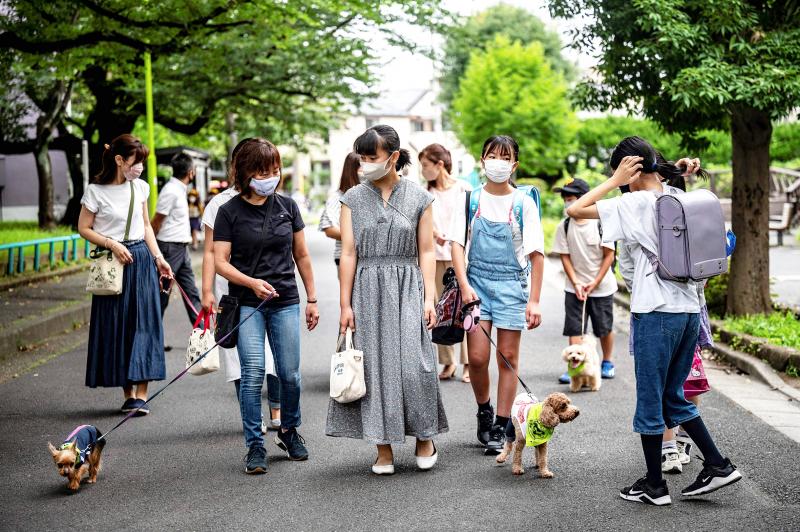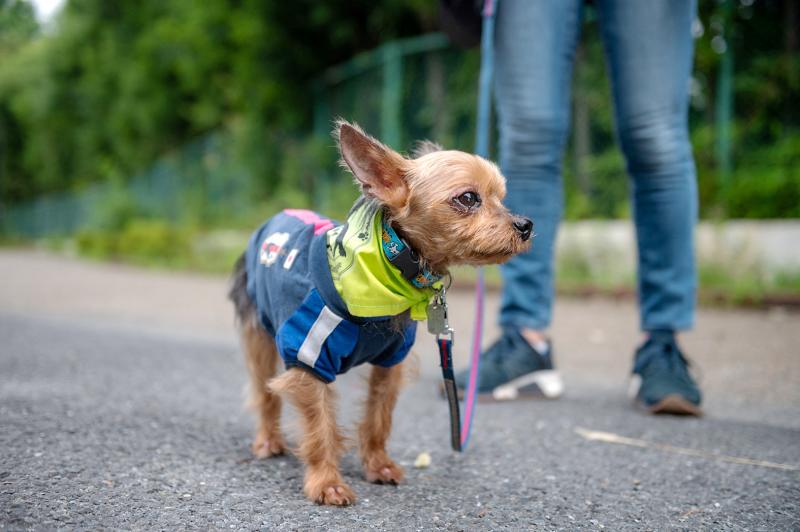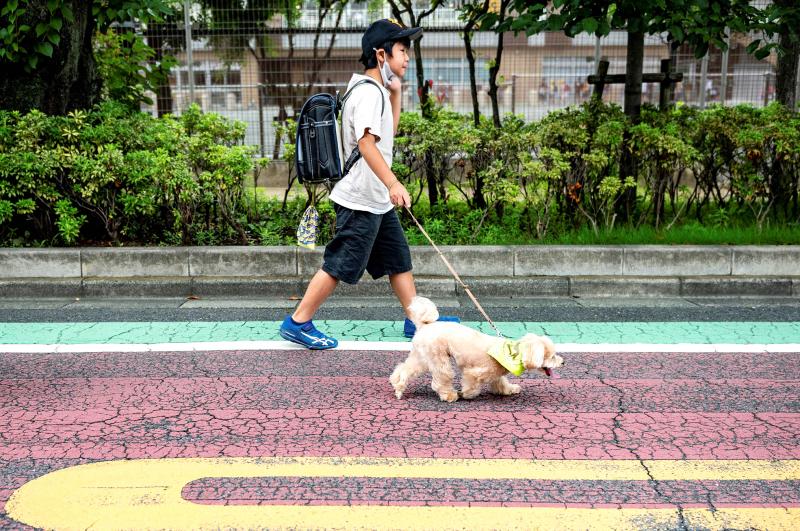It’s a neighborhood watch with a difference. A clean-nosed crew, sniffing out trouble and keeping the streets safe for school kids: meet the pups of Tokyo’s real-life Paw Patrol.
They might not have the gadgets and gear of their beloved cartoon counterparts, but the dogs of the Wan-Wan (“bow-wow”) Patrol are firm favorites in Tokyo’s Karasuyama neighborhood.
Twelve-year-old Yurika Igarashi counts on seeing Sakura, a fluffy toy poodle, when she’s on her way home from school.

Photo: AFP
“Sometimes I’m scared when I’m coming home alone, but I feel okay when I’m walking with Wan-Wan Patrol,” she said, gently cradling Sakura on her lap.
Sakura is one of 150 pups who form the Wan-Wan Patrol, a program that enlists dogs and their owners to turn their daily walks into a neighborhood watch, monitoring children, looking out for residents and helping deter crime.
The Karasuyama program is one of the oldest such community initiatives in Japan and was founded by a local police officer.

Photo: AFP
“Individual owners walk whenever they can and have their dog wear the same scarf,” said Keiko Shimizu, the patrol’s current leader.
Clearly marked canines patrolling the streets means “we can help make the neighborhood less prone to crime,” she added.
Many of the dog owners are parents of current and former students of the local school, but others just participate in the community watch as residents.

Photo: AFP
On one recent morning, five pooches in Wan-Wan Patrol’s lime-green neckerchiefs wagged their tails as they accompanied children going to elementary school.
Pu, a 17-year-old shih tzu, is one of the oldest members of the patrol and can no longer walk by herself. But she proudly participates from the comfort of a doggy stroller pushed by her owner.
‘CAREFREE’ PLAY
“The program helps us get to know each other and become good neighbors, and I feel this place stays safe that way,” said Michiko Takeuchi, owner of poodle and Maltese mix Kojiro, and mother to a local schoolboy.
And the patrol isn’t just for show.
“We had a member who found an elderly person who had passed away alone,” patrol leader Shimizu said. “They realized by noticing a room light still on in the morning. We walk at around the same hours on the same route everyday, so it’s easier for us to notice if there is something unusual.”
Japan has a reputation as one of the world’s safest countries, with very low rates of violent crime.
But there are occasional tragedies, including a devastating accident last month east of Tokyo in which a drunk driver crashed his truck into a group of schoolchildren, killing two.
Jun Ameie, principal at the local Kyuden Elementary School, said the neighborhood watch helps reassure parents and children alike.
“Parents appreciate that many people in the neighborhood care and make sure the environments safe, especially these days when we hear a lot of reports about crimes involving children,” he said.
“I’m sure that children can play carefree outside of school and anywhere in the neighborhood, because they know many adults keep their eyes on their safety,” Ameie added.
For young Igarashi, the cuddly canines are a reliable source of comfort.
“Of course, it’s fun to walk with the dogs, but I also feel protected by them.”

The primaries for this year’s nine-in-one local elections in November began early in this election cycle, starting last autumn. The local press has been full of tales of intrigue, betrayal, infighting and drama going back to the summer of 2024. This is not widely covered in the English-language press, and the nine-in-one elections are not well understood. The nine-in-one elections refer to the nine levels of local governments that go to the ballot, from the neighborhood and village borough chief level on up to the city mayor and county commissioner level. The main focus is on the 22 special municipality

The People’s Republic of China (PRC) invaded Vietnam in 1979, following a year of increasingly tense relations between the two states. Beijing viewed Vietnam’s close relations with Soviet Russia as a threat. One of the pretexts it used was the alleged mistreatment of the ethnic Chinese in Vietnam. Tension between the ethnic Chinese and governments in Vietnam had been ongoing for decades. The French used to play off the Vietnamese against the Chinese as a divide-and-rule strategy. The Saigon government in 1956 compelled all Vietnam-born Chinese to adopt Vietnamese citizenship. It also banned them from 11 trades they had previously

In the 2010s, the Communist Party of China (CCP) began cracking down on Christian churches. Media reports said at the time that various versions of Protestant Christianity were likely the fastest growing religions in the People’s Republic of China (PRC). The crackdown was part of a campaign that in turn was part of a larger movement to bring religion under party control. For the Protestant churches, “the government’s aim has been to force all churches into the state-controlled organization,” according to a 2023 article in Christianity Today. That piece was centered on Wang Yi (王怡), the fiery, charismatic pastor of the

Hsu Pu-liao (許不了) never lived to see the premiere of his most successful film, The Clown and the Swan (小丑與天鵝, 1985). The movie, which starred Hsu, the “Taiwanese Charlie Chaplin,” outgrossed Jackie Chan’s Heart of Dragon (龍的心), earning NT$9.2 million at the local box office. Forty years after its premiere, the film has become the Taiwan Film and Audiovisual Institute’s (TFAI) 100th restoration. “It is the only one of Hsu’s films whose original negative survived,” says director Kevin Chu (朱延平), one of Taiwan’s most commercially successful